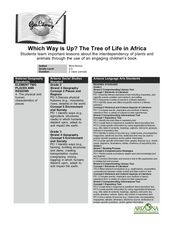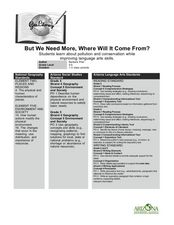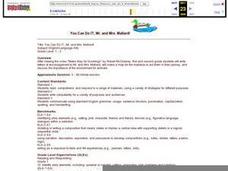Curated OER
Determining Solutions to a Problem - Fire Cloud
Students watch a video of a fire and determine solutions to the problem. In this problem solving lesson, students watch a video of a fire on a horse farm and complete a problem/solution graphic organizer. They identify the problem in the...
Curated OER
Death On Board La Belle: Finding Clues from Old Bones
Students practice analyzing skeletal remains for clues by using the Internet. In this scientific investigation lesson, students research the La Belle shipwreck using the Internet and written materials, later completing a Skeletal...
Channel Islands Film
Island Rotation: Lesson Plan 2
Why are Torrey pines only found in La Jolla, California and on Santa Rosa Island? Class members examine images of Torrey pines from these two locations, noting the similarities and differences, and then develop a demonstration model that...
Curated OER
Multimedia Book Reports
Students read a chapter book of 100-200 pages in length. They create a story map and multimedia book report. Pupils review the elements of a story map such as: characters, setting, problem, important events, solution, etc.) Students...
Anchorage School District
Writing Reference Sheet
Print out this handy reference page double sided and distribute it to your class. Individuals can use the page to aid them as they work on their topic sentences, transitions, conclusions, and paragraph structure. There is plenty of...
Anchorage School District
Topic Sentences Wall Poster
Developing a topic sentence can be a real challenge for young writers. Make the process a whole lot easier with a poster that can be displayed in the classroom. The visual first describes the two parts of the topic sentence, the occasion...
Curated OER
Writing Effective Thesis Statements and Introductory Paragraphs for Research Papers
After reading on the topic of their paper, high schoolers work in pairs to assess how to write powerful, precise thesis statements. The introduction contains three statements: a universal statement, a bridge statement, and a thesis...
Curated OER
Comparing Themes Across Texts
Read various texts to compare the themes across each text. Learners write a journal entry describing the most beautiful scenery they've seen and use a map of the United States to locate the Sequoia National Park and Muir Woods. They then...
Curated OER
Where's King Solomon when we need him?: Good decisions on resources
Students use geographic information to suggest how to manage natural resources through a simulation. They engage in a simulation, and decide how to protect, allocate, and exploit the resources of a hypothetical location.
Curated OER
Give a Hoot - Don't Pollute at Black Bayou Lake
Fourth graders visit Black Bayou Lake refuge to observe the effects of land and water pollution. They photograph examples of pollution. They list the effects of land and water pollution. They write a persuasive letter to convince others...
Curated OER
Which Way is Up? The Tree of Life in Africa
Students read a book titled This is the Tree about a baobab tree and draw a picture and label the tree. In this tree lesson plan, students also write a paragraph explaining why they drew that tree.
Curated OER
If These Walls Could Talk: Seeing a Culture Through Human Features
Students read Talking Walls and discuss the walls presented and their importance to the culture. In this geography lesson, students locate and label each country/continent discussed in the book on a world map. Students take a walk and...
Curated OER
But We Need More, Where Will It Come From?
Students write a persuasive letter and create a poster about pollution and conservation. In this pollution and conservation lesson plan, students learn how humans are the number 1 cause of pollution.
Hawaiʻi State Department of Education
Finding the Main Idea
You can mix almost any subject with an arts curriculum. Find out how to use drama to find the main idea of a literary text. You'll read a story, and then learners will make tableaus showing what happened, or what they think will happen...
Curated OER
“THE LORAX” by Dr. Seuss
Few children's books convey the message of conservation as well as Dr. Seuss' The Lorax. Read the story aloud, emphasizing the interconnectedness of plants and animals in an ecosystem and discussing different ways people can help...
Curated OER
You Can Do It, Mr. And Mrs. Mallard!
Students watch the video "Make Way for Ducklings" by Robert Mc Closkey. They write letters to Mr. and Mrs. Mallard and make a map for the mallards. They talk about the importance of animal habitats.
Curated OER
Gearing up for Grammar
Young scholars input autobiographical information to apply in a Diamante' poem that utilizes the different parts of speech. Students interact with each other sharing their autobiographical information completed on the database created....
Curated OER
Where is Flat Stanley?
Learners create a story map of the basic elements and significant events of the book Flat Stanley. Students brainstorm places they would like to visit if they had been flattened and then, write about an imagined experience. Learners...
Austin Independent School District
Austin Independent School: 10 Major Types of Inference in Literature [Pdf]
This printable worksheet helps students recognize the difference between an implication and an inference. Students are presented with quotes from the text and they practice with each of the ten types of inference: location, agent, time,...


















![Austin Independent School: 10 Major Types of Inference in Literature [Pdf] Unknown Type Austin Independent School: 10 Major Types of Inference in Literature [Pdf] Unknown Type](https://d15y2dacu3jp90.cloudfront.net/images/attachment_defaults/resource/large/FPO-knovation.png)